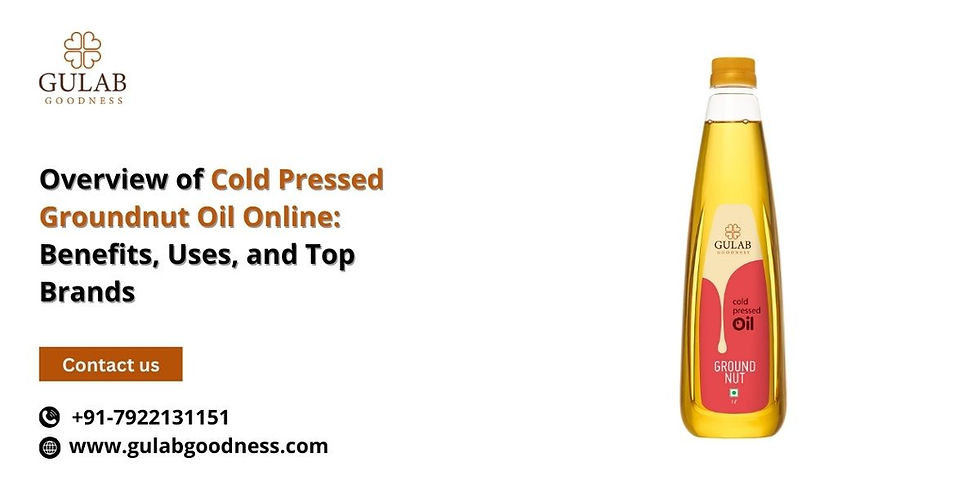How to Identify Authentic Cold Pressed Groundnut Oil in the Indian Market
- Jenny Clinton

- Jul 25, 2025
- 4 min read

In recent years, there has been a growing shift among Indian households toward healthier cooking oils, and one that stands out is cold pressed groundnut oil. Known for its rich flavor and nutritional benefits, this oil is extracted using traditional methods without heat or chemicals, making it a top choice for health-conscious consumers. But with rising demand comes a flood of products in the market—some authentic, others not so much. So, how can you identify genuine cold pressed groundnut oil in the Indian market?
Let’s break it down in a way that helps you shop smarter and cook healthier.
Understanding Cold Pressed Groundnut Oil
Cold pressed groundnut oil is made by mechanically pressing groundnuts (peanuts) at low temperatures, usually below 50°C. This method retains the oil's natural aroma, nutrients, and flavor. Unlike refined oils, which go through multiple chemical processes, cold pressed oils are minimally processed and chemical-free.
In India, where groundnuts are a staple crop, cold pressed groundnut oil has traditionally been used in many regional cuisines, especially in states like Gujarat, Tamil Nadu, and Andhra Pradesh. Its earthy taste and high smoke point make it ideal for both frying and sautéing.
Common Challenges in the Indian Market
The popularity of groundnut cold pressed oil has encouraged many brands to enter the market. Unfortunately, not all of them maintain the purity that cold pressed oil promises. Adulteration, mixing with refined oils, and poor storage practices are some of the common concerns. As a result, many buyers are left wondering whether the oil they’ve purchased is truly cold pressed or just another commercial product disguised as one.
To make an informed choice, consider the following pointers.
1. Check the Label Carefully
Always read the product label thoroughly. Authentic cold pressed groundnut oil will often mention phrases like “wood-pressed,” “lakdi ghani,” or “kachchi ghani” in regional markets. Look for:
Extraction Method: The label should specify "cold pressed" or "wood pressed."
Ingredients: Only groundnuts should be listed as ingredients.
No Additives: It should be free from added colors, preservatives, or chemicals.
Packaging Date and Shelf Life: Fresh oils have a shorter shelf life, usually around 6 months to a year.
2. Observe the Color and Smell
Genuine cold pressed groundnut oil has a light golden to amber color. The shade may vary slightly depending on the type of groundnut used and the season. More importantly, the aroma should be natural and nutty. If the oil smells neutral or overly pungent, it could be adulterated or refined.
3. Check for Cloudiness and Sediments
Pure cold pressed oil may appear slightly cloudy or contain small particles at the bottom. This is completely natural and a sign of minimal processing. Refined oils, on the other hand, are crystal clear due to chemical treatments.
4. Conduct a Taste Test
If you’re buying a small bottle for the first time, do a simple taste test at home. Cold pressed groundnut oil has a unique, slightly sweet and earthy flavor. It enhances the taste of food without overpowering it. If the oil tastes flat or synthetic, it's likely not genuine.
5. Look for Certifications
Some trustworthy brands in India go the extra mile by acquiring certifications that prove their oil’s quality and purity. Look for:
FSSAI mark
ISO certifications
Organic certification (if applicable)
These ensure that the product adheres to safety and quality standards.
6. Read Customer Reviews
If you’re planning to buy cold pressed groundnut oil online, always check customer reviews. Look for consistent feedback about taste, aroma, and packaging. Authentic products generally receive positive word-of-mouth and repeat purchases.
7. Buy from Reputed Brands
To avoid trial-and-error with unknown suppliers, stick with established brands known for their quality and transparency. Brands like Gulab Goodness have built a reputation for offering the best cold pressed groundnut oil in India. Their products are extracted using traditional wooden churners, maintaining both taste and health benefits.
8. Understand the Price Point
Cold pressed oils are generally more expensive than refined ones due to their slow and manual extraction process. If the price seems too low, it’s a red flag. However, keep in mind that a higher price doesn’t always mean better quality—so consider all the factors listed above together.
9. Storage and Packaging Matter
Authentic cold pressed oils are sensitive to light and heat. That’s why quality products are usually packed in dark glass bottles or high-grade food-safe plastic to preserve freshness. Avoid oils sold in transparent plastic bottles exposed to sunlight, especially at local shops.
10. Home Test for Purity (Optional)
Although not foolproof, a simple test you can try at home is the refrigeration test. Place a small amount of the oil in the fridge. Authentic cold pressed groundnut oil may thicken or develop a cloudy layer when chilled, which is normal due to the presence of natural fats.
Choosing the Right Brand: Why Gulab Goodness?
If you’re looking for a brand that checks all the boxes—purity, traditional methods, health benefits, and trust—Gulab Goodness is a reliable choice. They offer premium-quality cold pressed groundnut oil, made using age-old techniques and without compromising on quality. Whether you’re cooking for taste, health, or both, their oil is a valuable addition to your kitchen.
Final Thoughts
Identifying authentic cold pressed groundnut oil in the Indian market doesn’t have to be a guessing game. By paying attention to labels, packaging, aroma, texture, and brand reputation, you can make better choices for your family’s health.
In a market full of options, let transparency and quality be your guiding factors. And if you’re ready to take the step toward healthier cooking, choose a trusted brand like Gulab Goodness—a name that stands for purity and tradition.
Gulab Goodness or contact us to place your order, request samples, or learn more about our process.

Comments